Poker has been made popular by films such as Rounders, alongside the astounding story of Chris Moneymaker who achieved the incredible feat of converting an $86 satellite victory into a $2,500,000 triumph at the WSOP. The Moneymaker Effect has inspired thousands of newcomers to make an attempt at replicating the same success, with many people flourishing in his wake. For instance, at the time of writing, the professional poker player Justin Bonomo is officially leading the all time money list for the most amount of money won by participating in tournaments with accumulated winnings of $57,517,404.
However, none of these success stories would be possible without first learning the core principles concerning the game of poker, more specifically the order of poker hands. This synopsis will provide those that are considering venturing into the domain of poker with the tools necessary to comprehend the order of poker hands while demonstrating how effortless it can be to keep them to memory. Additionally, by imparting this foundation of knowledge, GipsyTeam believes readers will then have the opportunity to delve into the more refined aspects of poker that more advanced players are well-versed in.
What are poker hands?
While the origins of poker date back centuries ago, it was only until the start of the year 1998 that poker was made accessible online. Nowadays, according to estimates, over one hundred million people play poker online throughout the world, with No Limit Hold’em being the most frequently sought-out format. This involves each player being dealt two cards face-down, with five community cards dealt face-up in the centre of the felt. These are known as community cards because they can be accessed by all of the players at the table. Poker hands are the best five-card combination of the two cards that have been dealt to each player, with the five community cards in the centre. The winner is the player with the highest ranking poker hand.
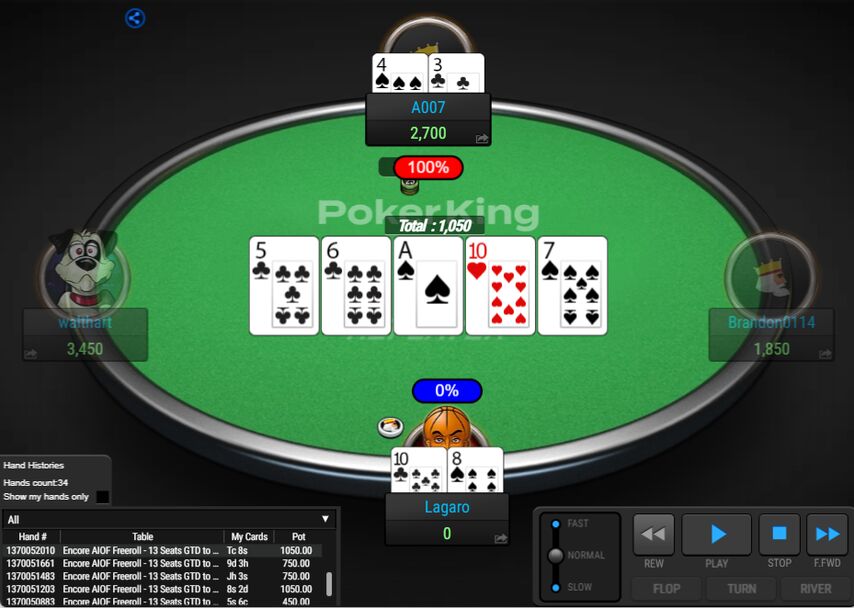
In this instance, two players were competing for the pot. If we combine their two cards with the five community cards to make the best possible five-card combination for each player, this is the result:
- A007’s best five-card combination is 3 – 4 – 5 – 6 – 7, taking the 3 and 4 from the cards dealt to them, along with the 5, 6, and 7 from the community cards
- Lagaro’s best five-card combination is 10 – 10 – A – 8 – 7, pairing the 10 dealt to them with the 10 from the community cards, along with the ace, 8, and 7 as the highest cards.
Lagaro has one pair of tens, whereas, A007 has a straight which is five cards in successive numerical order. As we will see later in this article, a straight is a higher ranking poker hand compared to one pair. Therefore, A007 was awarded the pot, and Lagaro was eliminated from the tournament as they had zero chips remaining.
High Card
The worst and most common hand rank in poker is known as high card. In fact, the chances of a player only being dealt high card is approximately fifty percent. This occurs when after combining the cards dealt to you and the community cards, the best outcome you can achieve is a high card. Despite being the worst-ranked hand in poker, there are rare circumstances where high card prevails.

One Pair
The next strongest poker hand is one pair. This occurs most often when a card dealt to a player has the same value as one of the community cards. An old adage in poker you may hear some players say is “it’s hard to make a pair”. On the contrary, the chances of flopping a pair are approximately thirty percent, whereas, the probability of making a pair when all five community cards are available is roughly forty-four percent.

Two Pair
Naturally, as we progress through the order of poker hand rankings, following one pair is two pair. There are a number of ways in which two pair can be achieved:
- If a player is dealt two cards each with different values that have the same value as two community cards that have different values (Example 1)
- A single card dealt to the player may have the same value as a single community card, with two other community cards having the same value (Example 2)
- The two cards dealt to the player may have the same value, i.e. the player was dealt a pocket pair, along with, two community cards having the same value (Example 3)
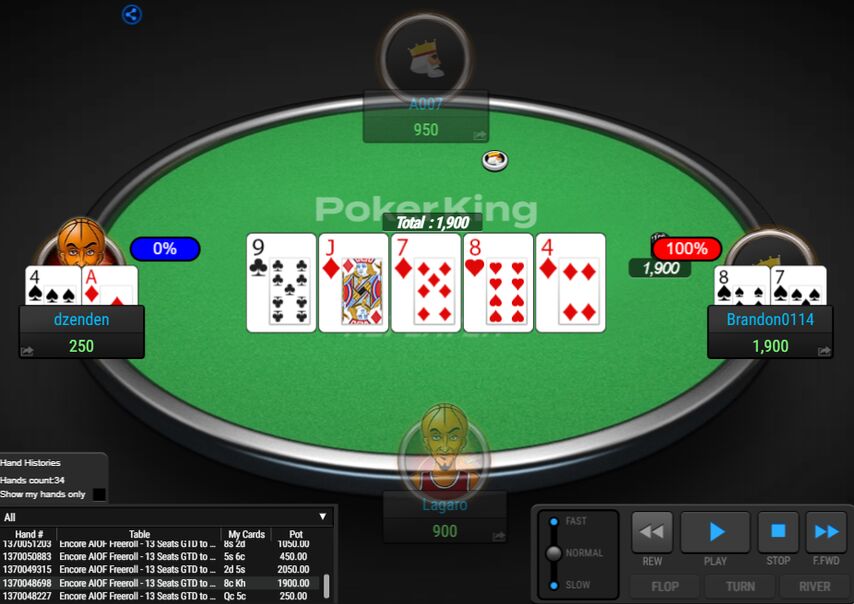
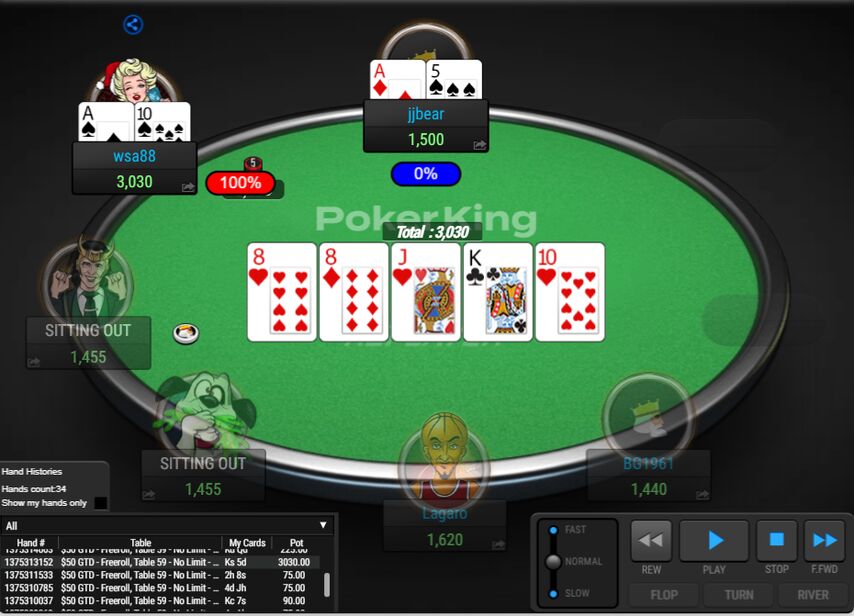
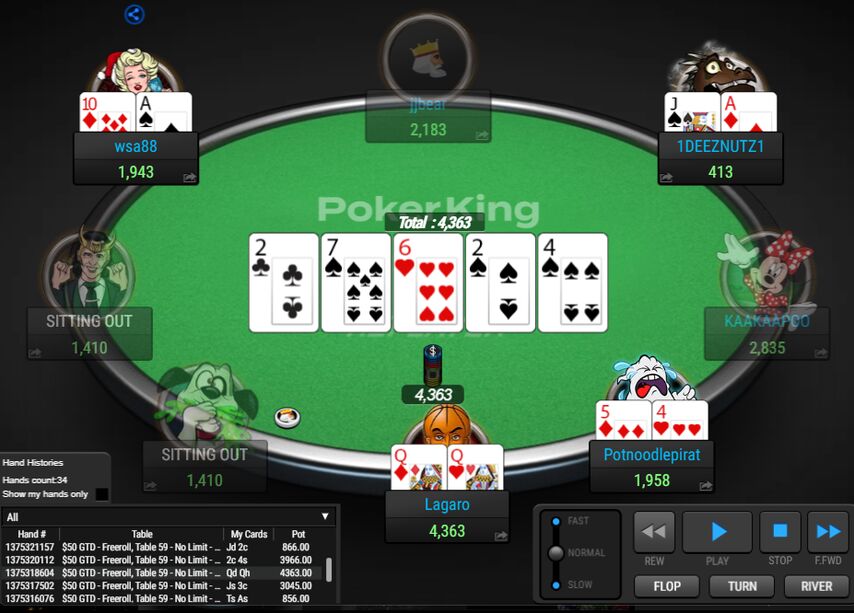
In the first scenario, the eight and the seven dealt to Brandon0114 have the same value as the eight and the seven amongst the community cards. As a result, their best five-card hand is 8 – 8 – 7 – 7 – J.
Additionally, in the second example, the ten dealt to wsa88 has the same value as the ten amongst the community cards, while the two eights that are also part of the community cards have the same value. Therefore, the best five-card hand is 10 – 10 – 8 – 8 – A.
What’s more, as Lagaro was dealt two queens in the third scenario, with two twos amongst the community cards, they also have two pair with the best five-card hand being Q – Q – 2 – 2 – 7. Interestingly, the chances of a player being dealt two identical cards, otherwise known as a pocket pair, is approximately 0.06 percent.
Three of a Kind
The poker hands that will be discussed from this point onwards are statistically more difficult to achieve. The first of the stronger ranked poker hands is three of a kind, otherwise known as trips. As the name suggests, this occurs when a player can combine the cards dealt to them with the community cards to hold three cards with an identical value.
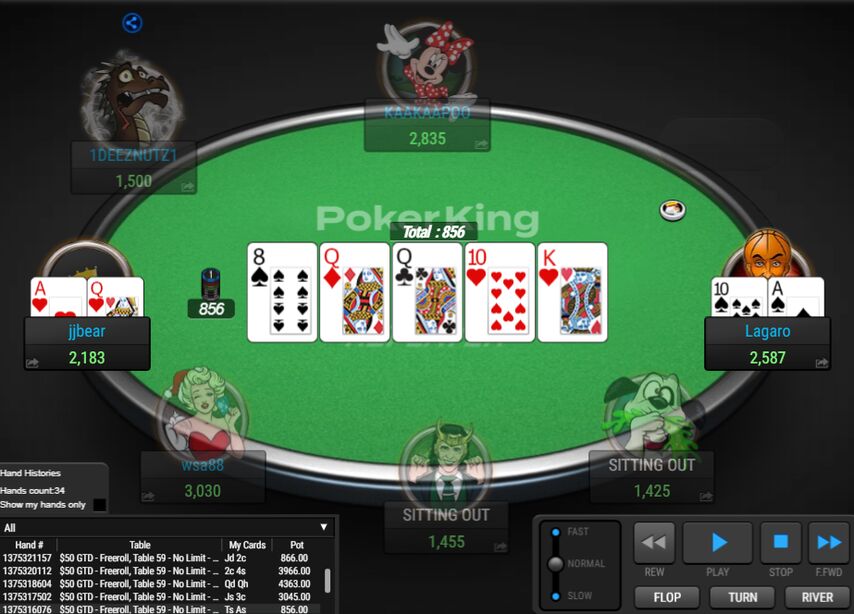
In this example, Lagaro has two pair by combining the ten dealt to them with the queens from the community cards. Therefore, their best five-card hand is Q – Q – 10 – 10 – A. However, jjbear has three of a kind by combining the queen dealt to them with the two queens from the community cards. As a result, jjbear’s best five-card hand is Q – Q – Q – A – K. JJbear’s hand can also be referred to as ‘trip queens’.
An alternative way of achieving three of a kind occurs when a player is dealt a pocket pair that corresponds to one of the community cards. For instance, in a previous example, Lagaro was dealt two queens. If there was another queen amongst the community cards, they would have had three of a kind. Incidentally, the chances of flopping trips while holding a pocket pair is approximately twelve percent.
A Straight
This poker sequence has been touched on previously. In order to make a straight, a player must combine the cards dealt to them with the community cards so that there are five cards in successive, numerical order. However, it is important to note that the suit of all five cards cannot be identical. This is known as a straight flush which is significantly more difficult to achieve than a straight and will be discussed later in this synopsis.
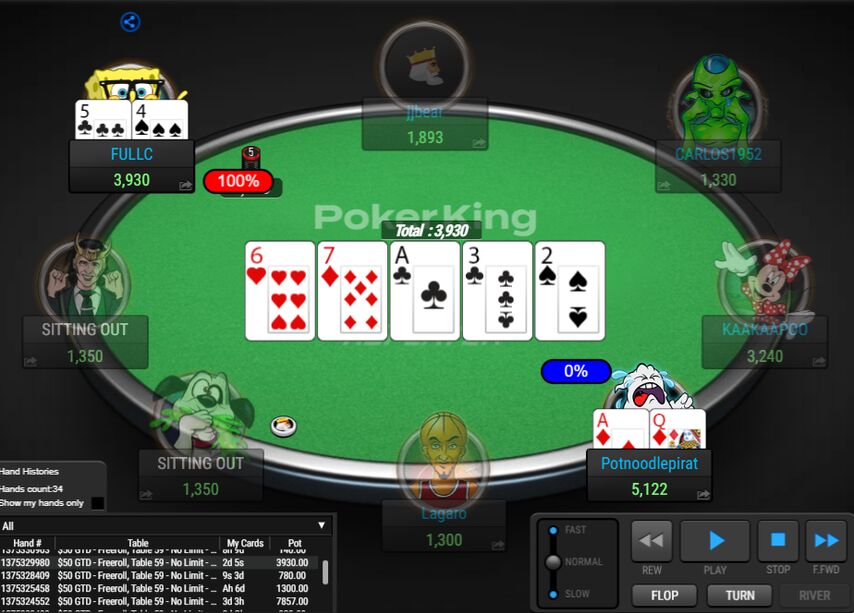
In this case, Potnoodlepirat has one pair as their best five-card hand is A – A – Q – 7 – 6. On the other hand, FULLC has a straight by combining the five and four dealt to them, with the seven, six, and three from the community cards. Consequently, their best five-card hand is 7 – 6 – 5 – 4 – 3.
On the flop, which is the first three community cards, in this instance 6 – 7 – A, FULLC has an open-ended straight-draw. The probability of FULLC completing their straight once all community cards are revealed is approximately thirty-one percent.
During this poker sequence, aces are both low and high. This means that the smallest straight begins with an ace and ends with a five; A – 2 – 3 – 4 – 5. By contrast, the strongest straight starts with a ten and ends with an ace; T – J – Q – K – A. However, it is important to bear in mind that if an ace is involved in a straight, it must either be at the start or end of the sequence. In other words, J – Q – K – A – 2, Q – K – A – 2 – 3, and K – A – 2 – 3 – 4 would not qualify as a straight.
A Flush
For a player to make a flush, it is necessary to combine the cards dealt to them with the community cards to form a five-card sequence where each card is part of the same suit. However, the cards involved must not be in successive numerical order as this would be a straight flush.
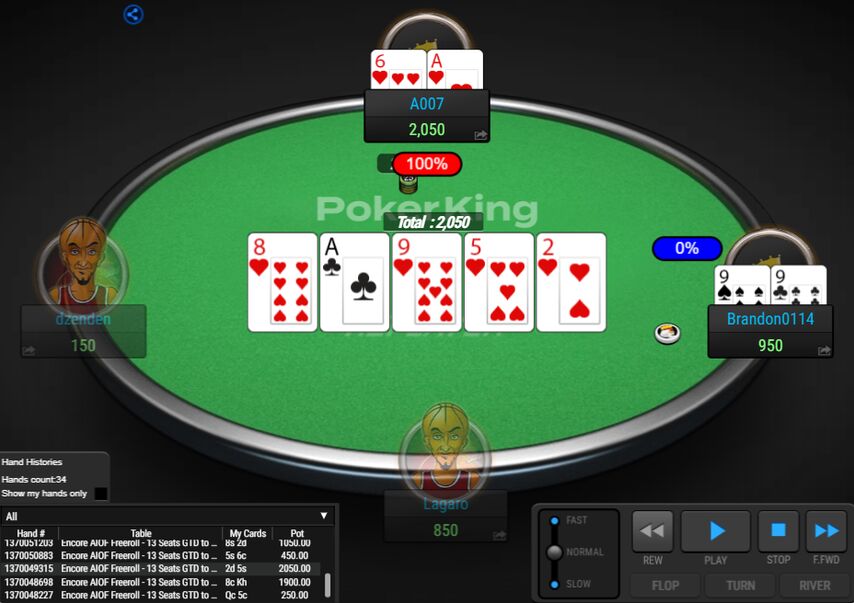
In this scenario, Brandon0114 has three of a kind with their best five-card combination being 9 – 9 – 9 – A – 8. In comparison, A007 has a flush as they can combine the cards dealt to them with the community cards to create a five-card sequence of hearts.
On the flop, A007 has a pair of aces and a flush-draw. The chances of A007 completing their flush-draw once all the community cards are revealed is approximately thirty-five percent.
While aces act as low and high cards in straights, aces are always high for flushes, and therefore create the higher ranked flushes. It is of course possible for more than one player to have a flush at the same time. If such circumstances do occur, to determine a winner it is necessary to look at all of the cards involved in each player’s sequences. For example, A – Q – J – 8 – 6 of the same suit would beat A – Q – J – 7 – 5.
A Full House
The poker hands that will now be addressed are some of the highest ranked in the game and are very rarely beaten. For instance, a full house is a five-card sequence that combines trips with a pair.

Four Of A Kind
As the name suggests, four of a kind, or quads as it is otherwise known, requires having four cards with identical values. There are several ways in which four of a kind can be achieved:
- A player may be dealt a pocket pair, i.e. two cards of the same value, along with two community cards being identical to those dealt cards
- There may be three identical community cards with the player being dealt the last remaining card of that value in the deck
- There may be four identical community cards

In the scenario where there are four identical community cards, all players remaining in the pot have four of a kind. However, the player or players with the highest card dealt to them will be the winner. For instance, if the community cards were K – K – K – K – 4, each player has quad kings. But if the highest card being held by player A is a seven, giving them the five-card hand K – K – K – K – 7, this would be inferior to player B if their highest card was a ten, giving them K – K – K – K – 10.
A Straight Flush
A straight flush is amongst the best poker hands in the game. In fact, this hand is so rare that some players will spend tens of years playing poker without even making one. To do so requires combining the cards that have been dealt to you with the community cards to form a five-card sequence that is in successive numerical order, while at the same time, all cards must have the same suit. For example, if a player is dealt a ten and a nine, both of diamonds, and the community cards contain the eight, seven, and six of diamonds, they would have a straight flush.
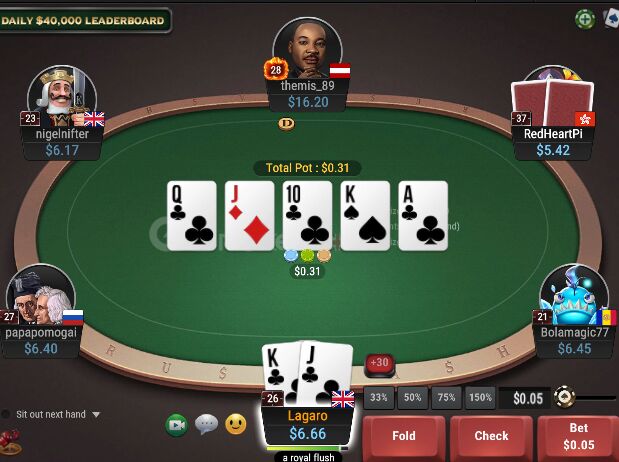
In this instance, Lagaro has managed to make the highest ranking straight flush, otherwise known as a royal flush. This involves a player’s best five-card hand being A – K – Q – J – T all of the same suit. The statistical probability of this occurring is approximately 0.003%. A royal flush cannot be beaten, but, in the extremely unlikely scenario that you lose with a straight flush at a casino, make sure you show the dealer your cards because the property you are at may have a bad-beat jackpot.
Ready to test your skills? Start with freerolls — these are tournaments with real money prizes and no enter's fee.
Summary: Poker Hand Chart
To summarise this synopsis regarding the best poker hands, a poker hand chart has been provided below that can act as a cheat sheet to assist with memorising the strongest and the weakest ranking poker hands. It is worth mentioning, however, that poker hand rankings aren’t as cut and dried as they may seem. This is because while one pair, for example, may appear to be a weak poker hand relative to the overall rankings, it could be a very strong hand given the community cards available.
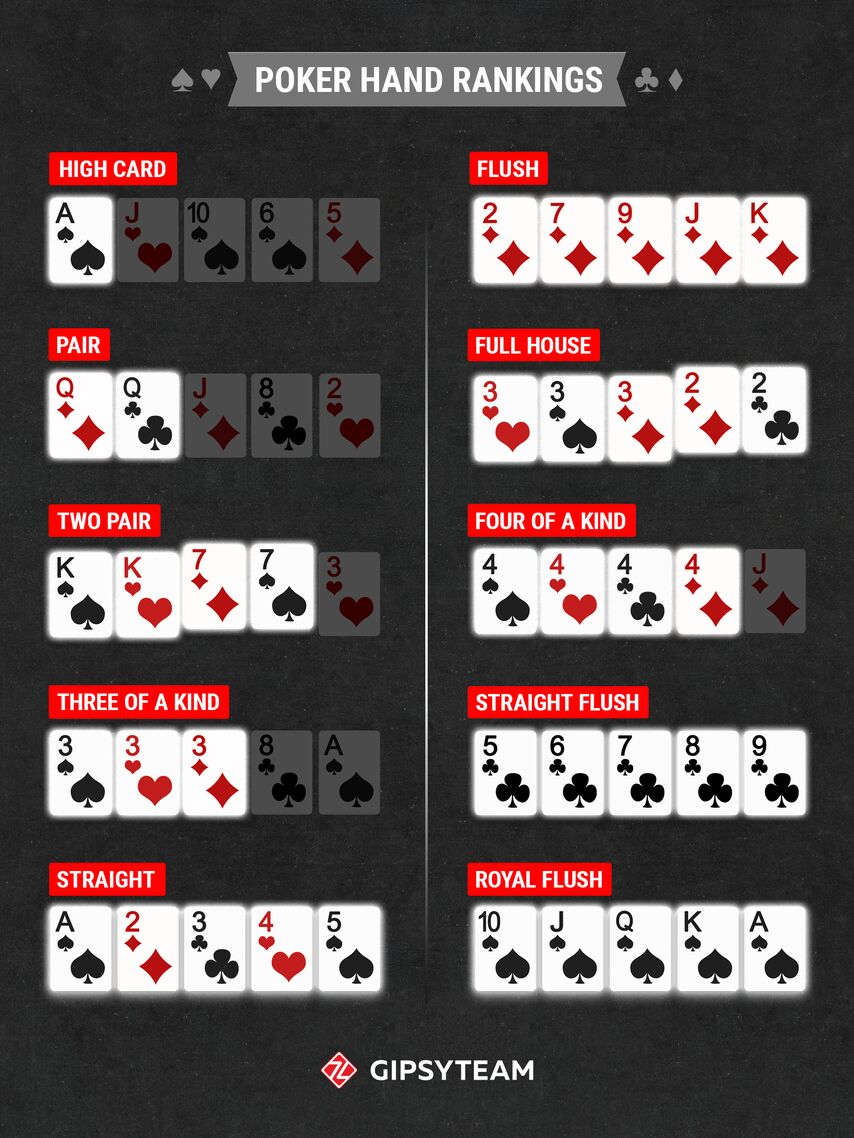
Good luck in the world of online poker! If you still have any questions, feel free to contact our friendly and professional support team:
- Increased rakeback and personal bonuses
- Help with deposits and cashouts
- Access to mobile applications
- Solving problems with accounts
- Technical support
- Questions about the site and forum




























